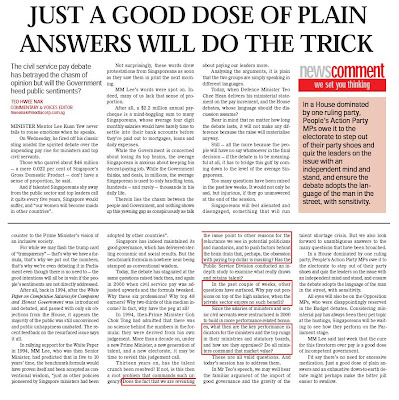First it was MCA's Ong Tee Keat for asking where govt money for Chinese schools went, and now it's Gerakan's turn to be bitch slapped for taking a mufti to task.
Federal Territory Gerakan chairman Datuk Dr Tan Kee Kwong yesterday apologised for his remarks about the Perak mufti, Datuk Seri Harussani Zakaria, during a press conference at the FT Gerakan convention here last Sunday.
“I humbly and sincerely apologise for the remarks,” he said in a press release, adding that it was made in his personal capacity.
This is just pathetic. And I think it underlines the reality that
non-Malay BN component parties have virtually no power to even speak up, much less safeguard the rights and interests of the Chinese, Indians dan lain-lain, in this country. I hope the voters in
Machap take this latest example of the escalating racial & religious erosion of secular Malaysia, into consideration during polling day.
And those of you who are thinking of giving PAS the benefit of a doubt,... maybe they are more honest than UMNO because they are god-fearing men... THINK AGAIN!
Read the article (text below) by Farouk A. Peru about PAS' comments in relation to this Gerakan-mufti issue. PAS is NO DIFFERENT from UMNO. Birds of the same feather, infected by the same thuggish, chauvinistic, domineering bird flu.
UMNO threatens to repeat the May 13, 1969 incident to 'defend' the "special rights" of Malays. (
incidentally, I read this funny comment on "special rights". When we say "special children" or "special people"... we usually refer to the retarded right? So... when we say people with "special rights"... hmmmm...).
PAS threatens to repeat the May 13, 1969 incident to 'defend' the "sanctity" of Islam.In my book, both UMNO and PAS have stated in no uncertain terms that they will readily resort to violence and bloodshed, when they are bankrupt of morally justifiable reasons for their discriminatory actions (be it racial or religious). Both must be stopped dead at the polling booth!
Voters of Machap... place your vote well... or else Machap might eventually turn into Mati, taking the rest of this country with it.
Poverty of political thuggery
Farouk A. Peru
http://malaysia-today.net/blog2006/index.php?itemid=3705
Muslims are told in the Quran to uphold fairness and justice, even if it is against themselves. They are told that God commands with justice and never with things which are considered obscene. Unfortunately, this was not displayed in PAS’s reaction here.
A background of the story can be found here and if the news were true, then clear is this: The Mufti of Perak was guilty of gross misconduct. To my knowledge, he wasn’t made to pay for his actions.
Gerakan has called for the Mufti’s sacking. Are they right in doing so? Lets follow PAS’s line of reasoning along with my comments:
“Gerakan diingatkan agar lebih cermat dalam membuat sesuatu usul demi menjaga perpaduan nasional kerana umat Islam tidak boleh menerima apabila Islam dicabar,” ujar Ahli Jawatankuasa PAS Pusat, Ustaz Taib Azamuddin kepada Harakahdaily pagi tadi.(Gerakan is reminded to be more careful in doing something in the interest of national unity because the Islamic ummah cannot accept when Islam is challenged’ said the PAS central committee member, Ustaz Taib Azamuddin to Harakahdaily this morning).
My comments:
1. What does ‘more careful’ mean in this case? Asking him to be questioned and then prosecuted?
2. Speaking for the Muslim ummah is presumptuous. There are enough Muslims with a fair conscience, who aren’t afraid to speak the truth, to call a spade a spade. Taib here is looking for political mileage, something quite common in PAS politics.
3. Was ISLAM challenged here, Taib? Gerakan is actually calling for an ISLAMIC response to the matter which is the upholding of justice. This Mufti guy nearly caused a race riot because of his insecurities and so why is calling him to be punished a challenge to ‘Islam’. My guess is because if the Mufti falls, then the next to fall would be the PAS higher echelons who have been very irresponsible in their pronouncements too. Lets not forget the Nik Aziz and the ‘carut’ incident.
Beliau yang merupakan bekas Imam Besar Masjid Negara berkata persoalan Mufti bukanlah perkara yang bersifat peribadi tetapi ia merupakan suatu jawatan yang menyentuh kewibawaan Islam itu sendiri (Taib, who was the ex-Head Imam of the National Mosque said that the issue of Mufti’s was not something personal but was a position which touched the dignity and station of Islam itself).
For the issue to be a challenge to the dignity and station of Islam itself, the Mufti should have acted in accordance with Islam itself. News reports tell us that the Mufti had ample chance to investigate the matter before creating the kind of panic would have ‘bathed the nation in blood’, to use a popular current expression in Malaysian politics.
Beliau juga mengingatkan kepada Umno agar lebih prihatin dalam perkara-perkara seperti ini, kerana apabila mereka sendiri yang longgar dalam urusan agama ini, ia sekaligus menjadi peluang untuk mencemarkan perkara yang berkaitan dengan agama di masa akan datang. (He also reminds UMNO to be more aware in matters such as these because when they themselves are lenient in religious matters, they become opportunities to discredit matters with regards to religion in the future).
And this, my dear readers is the crux of the matter. Nicely tucked away for our subconscious minds to catch. It’s UMNO’s leniency which will allow opportunities to discredit the religion. PAS however won’t be so lenient, until of course it’s time to win your vote. When that happens, Tuan Guru (master teacher) will gently persuade you that his Islamic state (his, don’t forget) will be very fair to non-Muslims.
Moving on to another PAS figure, we hear even stranger things:
Dalam pada itu, Pengerusi Lajnah Kebajikan dan Kemasyarakatan, Dewan Pemuda PAS Pusat, Ustaz Ridhuan Mohd Nor ketika dihubungi berkata, “Pemuda juga memberi amaran tegas kepada pemimpin Gerakan supaya tidak campurtangan dalam urusan agama Islam kerana ia cukup sensitif.” (At the same time, The Head of the Welfare and Social Division of the PAS Youth Assembly, Ustaz Ridhuan Mohd Nor when contacted said ‘The Youth also gives a strong warning to Gerakan leadership to stay out of Islamic religious affairs because it’s very sensitive’).
Once again, Islamic religious affairs are mentioned and touted as very sensitive. One might ask, do non-Muslims not have feelings and are they not sensitive. The emotional emasculation caused by this incident must have hurt the feelings of many.
Beliau yang juga Pengerusi Jawatankuasa Menangani Isu Murtad (FORKAD) juga mengharapkan Gerakan menghormati perkara 3, Perlembagaan Persekutuan dan kedudukan orang Melayu sebagai penduduk pribumi Malaysia. (He who is also the head of the Committee to Handle the Issue of Apostacy (FORKAD) also hopes that Gerakan respects the 3rd point of the Federal Constitution and the status of Malays as the native inhabitants of Malaysia.
He is reminding us of the very same constitution which PAS will efface the second they take power. Quite, quite strange.
Menurutnya, pada tahun 1950 orang Melayu telah berkompromi dengan kaum lain dan memperakukan mereka sebagai penduduk imigran dan mereka menerima hak istimewa orang Melayu dan Islam sebagai elemen yang didominasi oleh orang Melayu. (According to him, in 1950, the Malays had compromised with other races and acknowledged them as immigrants and they in turn accepted the Malay special rights and Islam as an element dominated by Malays).
Unbelievable!
Are non-Malays still immigrants 50 years on? They were born and bred in this country so show some respect. They are fellow Malaysians.
Islam is an element dominated by Malays? What if the entire country became Muslim? Hypothetically, would you accept them as your brothers in Islam or would Islam still be dominated by Malays. What did Prophet Mohamed say about this?
Tegas beliau, Forkad memberi amaran tegas kepada mana-mana pemimpin negara dan NGO supaya tidak bermain api kerana bimbang akan berulang kembali peristiwa 13 Mei 1969 (He strongly adds, FORKAD gives a stern warning to any national leader and NGO to not play with fire because of the worry of repetition of the incident of 13th May 1969).
And manifests the thuggery at last....
A gentler response can be seen from The Head of Information of PAS’s Muslim Women’s Assembly:
Menurut beliau jika sekiranya Dato’ Seri Harussaini bersalah, maka yang berhak dan berkuasa untuk mengambil tindakan terhadap beliau adalah Sultan Perak.(According to her, if Dato Seri Harussani was guilty, then the rightful and authoritative one to act against him would be the Sultan of Perak):
That would be constitutionally correct if the Mufti was acting as a Mufti. We must remember that a Mufti should have a great command of the corpus Islamica and should know that Muslims are commanded not to follow unverified information. Norman Fernandez had to remind the Mufti about how to handle information the Quranic way.
Malaysia is losing the respectable racial harmony it once had, given this piece of news. PAS is now using the ‘race card’ to win over voters with the voicing of its views. Not atypical of PAS but quite hypocritical given the ‘good cop’ style persuasion employed to win over non-Muslims.
I urge the Muslims to remember, the Quran doesn’t teach us to ignore our own failings. Rather we have a constant duty to correct ourselves and carry out our duties to better society, humankind as a whole. That is the ‘kewibawaan’ Islam which Prophet Muhammad brought forth. That is the same ‘kewibawaan Islam’ which is being challenged by the actions of the Mufti of Perak and now his defenders, PAS. Creating panic and threatening others who attempt to invoke justice is the opposite of Islam.
Let us act accordingly.




























